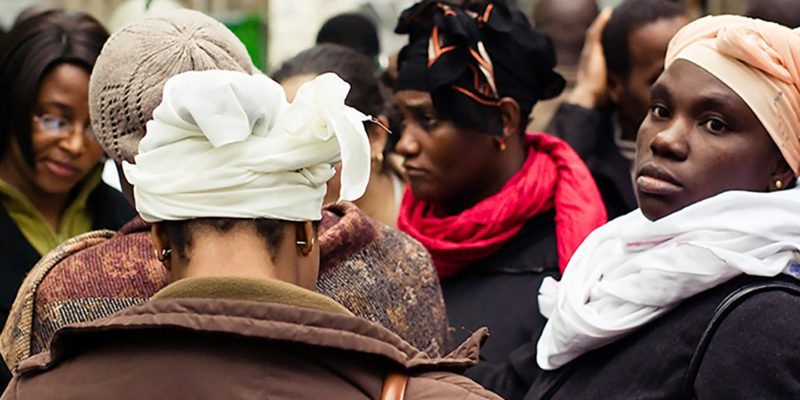When discussing migrants, the particular condition of migrant women is rarely focused upon. Migrant women are indeed typically doubly discriminated against; penalised both for being women and being foreigners. Along with structural and systemic racism, gender-based violence, and the risk of ending up in sexual exploitation, there is extreme difficulty in being able to obtain the proper documents to stay in Europe, as researcher Frohar Poya explained in “Undocumented migrant women in Europe in the post-covid period: the cases of Ireland, Malta and Poland and EU-wide implications”.
The report highlights that migrant women have been particularly penalised for three factors: the negative impact on work and on their documents; the loss of their house; sexual exploitation and abuse.
Firstly, as far as the question of work and documents is concerned – bearing in mind that most of the women interviewed in the research work in restaurants, in small supermarkets or as housekeepers – most migrant workers effectively lost their job. For example, the report reads, in Ireland, female domestic workers or employed in ‘low-skilled’ sectors have been severely affected by the loss of their source of income. In addition, many women have not had access to regularisation procedures due to bureaucratic delays. Also in Ireland, there were significant delays in the process of renewing visas; in Malta, despite the introduction of an online application system, migrant women had to face many difficulties either because they did not know the language or because they lacked the necessary resources to access the Internet and fill out applications for asylum requests or visa extension.
Secondly, migrant women had a hard time with regard to access to housing. According to the interviewees, reports Poya, in Ireland, many undocumented women have lost their accommodation. In Malta, one respondent reported that the government had set up services providing shelter for undocumented women during the COVID pandemic, however, due to poor dissemination of information about these services – and the general lack of access to information among migrant women – very few undocumented women benefited from shelters.
Thirdly, undocumented migrant women are often in danger due to sexual exploitation and abuse. In fact, according to the report, during the lockdown and the following period, in conjunction with the loss of housing, the impossibility of accessing services, and the loss of a job, the risk of being sexually exploited and abused increased for many. According to the interviewees, many women have been sexually exploited and abused without then receiving any legal protection. For example, in Malta, writes Poya, some undocumented women have been approached by men who asked them to have an affair in exchange for financial support. Poya points out that women who have experienced this form of coercion have not been able to obtain any type of material or legal support. The lack of complaints addressed to the authorities on cases of sexual abuse and exploitation, in fact, derives mainly from the severe socio-economic vulnerability of victims, and fear of being repatriated to the victim’s home country. According to Poya, among the factors that prevent migrant women from addressing the authorities are the fear of losing custody of their children, the fear of being deported to their country of origin, the fear of retaliation by the abusers, the lack of organisations and authorities to whom they could safely report violence, and language barriers. These five intersecting circumstances also apply to women who are discriminated against or sexually abused at work. According to the interviewees, undocumented female workers were paid below-average wages, sometimes not paid at all, because their employers often took advantage of their illegal status by threatening to report them to the authorities.
Finally, as far as access to healthcare is concerned, this remains an obstacle for all migrants, especially if they are undocumented, since, generally, a national identity card or health insurance is required. According to the interviewees, says Poya, regardless of how acute or severe their health condition was, the absence of a national identity card and/or insurance prevented migrant women from seeking professional medical care, even when they were very ill. Most avoid going to the emergency room out of fear of being detained and deported.
Despite the serious bureaucratic and systemic flaws and gaps that discriminate against migrant women – bearing in mind that their rights can only be truly protected with a radical change of the securitarian migration policies of the EU states – Poya outlines some possible solutions. First of all, it is necessary to make access to documents effective: this can be done, explains Poya, by channelling more resources towards specialised organisations led by women (migrants and non-migrants) in order to allow them to meet the needs of women who ask for help to these organisations and guaranteeing an effective legal system where undocumented migrant women can access services, accommodation and support – also to report violence and discrimination without fear of being deported. Finally, Proya writes, it is necessary for the EU States to respect the human rights regulations in force, starting with the Charter of Fundamental Rights of the EU, as well as a greater implementation of the Istanbul Convention (against violence against women, of the Council of Europe) and the CEDAW (United Nations Convention on the Elimination of Discrimination against Women) in national legislation.
This research study was produced within the HumMing Bird project. Humming Bird is a Horizon 2020 research that aims to improve the mapping and understanding of changing migration flows.
Photo via Flickr, William Hamon









